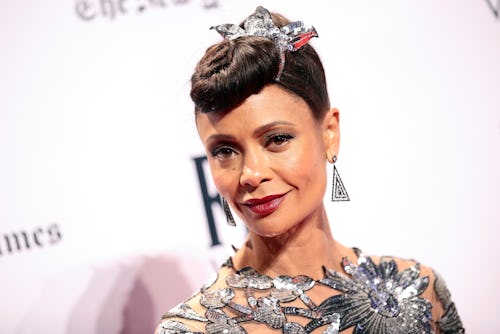Thandiwe Newton's tears are valid, but so are her missteps
The actress’s career and personal struggles illustrate the complexities of colorism.

While promoting her latest film God’s Country, Thandiwe Newton shed tears as she recounted the pain that comes with complexities around her skin tone. It’s another reminder of how race can complicate everything.
In the interview with Associated Press, Newton broke down after revealing her internal struggle with the belief that as a result of her lighter complexion, she took away acting opportunities and love interests from darker-skinned Black women. She even admits that she initially felt she shouldn’t portray the film’s lead role as Sandra Guidry, a professor grieving the death of her mother while also fending off white hunters from entering the forest behind her home. Newton thinks her character should be relatable for anyone who’s experienced discrimination, but she admits that her question of whether she should take the role comes from being scarred by resentment that she has received from Black women with dark skin.
“It’s been painful to have women who look like my mom feel I’m not representing them [and] that I’m taking from them,” she tearfully said on camera. “Taking their men; taking their work; taking their truth.”
Newton has let the world in on her struggle with the other side of colorism in the past. In May 2018, the actress tweeted she was crying after receiving harsh backlash over her comments of being “the first dark-skinned woman in a lead role in the Star Wars legacy...” for her role as Val in Solo: A Star Wars Story. Though the statement was an effort to call out the franchise for refusing to feature Black women, it came across as tone-deaf because of her own complexion. Newton grew up in England, with a white British man and a Black Zimbabwean woman for parents; she said that as a child, she felt “neither white nor black, but as a bridge between both.” She also told The Guardian in 2016 that she “resisted race” as the reason she had never been asked to grace the cover of Vogue. “I don’t even use the term ‘race,’” she insisted.
Those tears that flooded her face during the Associated Press interview were the product of a mind that is forced to see race in everything. In a 2020 Vulture interview, the Westworld actress admitted to primarily featuring her Black mother on her Instagram instead of her white father, because “I want Black people to feel they can trust me and feel safe with me — that I’m not a representative of this Establishment that degrades people of color.” The discussion of race brought her to tears during that interview as well, and she discussed how she’s been asked to spray tan her skin to get a darker complexion when she’s been told she’s not Black enough. She’s also said she’s been told she’s too Black and was in need of “[taking] it down [a notch],” two conflicting directives that would warp anyone’s view of themselves.
Hollywood has historically chosen Newton and other light-skinned Black women over qualified dark-skinned Black women, even when the role calls for the latter. Zoe Saldana caused an uproar after she darkened her skin and wore a prosthetic nose in order to portray the legendary Nina Simone, whose timeless music and activism was largely built in legitimizing dark skin to a racist, colorist world. In a 2020 interview, Saldana said that she thought her simply being a Black woman qualified her for the role, even if she was much lighter than the subject. But she admitted that she “should have done everything in my power to cast a black woman to play an exceptionally perfect black woman.” Saldana believing that her Black skin means she can represent all Black women in the roles she takes is similar to Newton’s presumptuous claim about her role in the Star Wars franchise.
But Newton’s tearful interviews illustrate the complexities of colorism as well: while fair-skinned women may enjoy privileges in some ways, they also experience their own unique, painful experiences that come with their complexion.
Race is as nuanced as the shades of color are varied, and the weight of it all is oftentimes too much to bear from the people who must live with it.